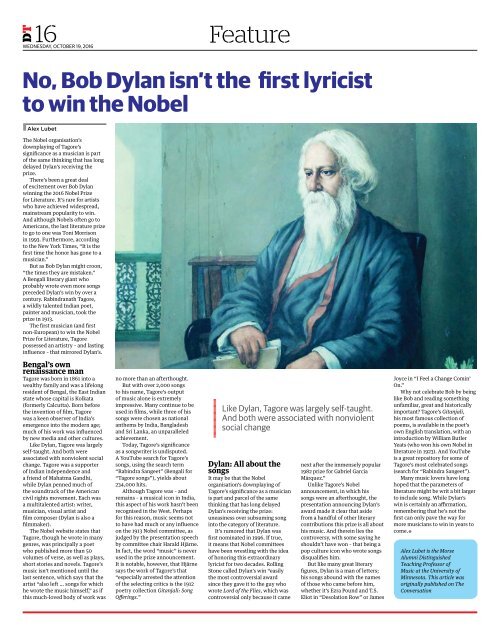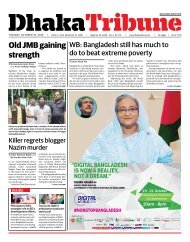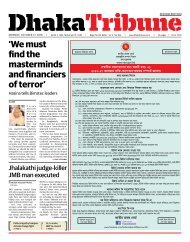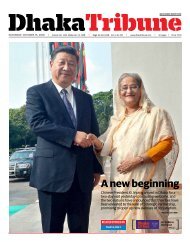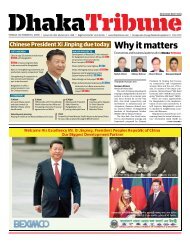ePaper_2nd Edition_October 19, 2016
Create successful ePaper yourself
Turn your PDF publications into a flip-book with our unique Google optimized e-Paper software.
16<br />
WEDNESDAY, OCTOBER <strong>19</strong>, <strong>2016</strong><br />
DT<br />
Feature<br />
No, Bob Dylan isn’t the fi r s t lyricist<br />
to win the Nobel<br />
• Alex Lubet<br />
The Nobel organisation’s<br />
downplaying of Tagore’s<br />
significance as a musician is part<br />
of the same thinking that has long<br />
delayed Dylan’s receiving the<br />
prize.<br />
There’s been a great deal<br />
of excitement over Bob Dylan<br />
winning the <strong>2016</strong> Nobel Prize<br />
for Literature. It’s rare for artists<br />
who have achieved widespread,<br />
mainstream popularity to win.<br />
And although Nobels often go to<br />
Americans, the last literature prize<br />
to go to one was Toni Morrison<br />
in <strong>19</strong>93. Furthermore, according<br />
to the New York Times, “It is the<br />
first time the honor has gone to a<br />
musician.”<br />
But as Bob Dylan might croon,<br />
“the times they are mistaken.”<br />
A Bengali literary giant who<br />
probably wrote even more songs<br />
preceded Dylan’s win by over a<br />
century. Rabindranath Tagore,<br />
a wildly talented Indian poet,<br />
painter and musician, took the<br />
prize in <strong>19</strong>13.<br />
The first musician (and first<br />
non-European) to win the Nobel<br />
Prize for Literature, Tagore<br />
possessed an artistry – and lasting<br />
influence – that mirrored Dylan’s.<br />
Bengal’s own<br />
renaissance man<br />
Tagore was born in 1861 into a<br />
wealthy family and was a lifelong<br />
resident of Bengal, the East Indian<br />
state whose capital is Kolkata<br />
(formerly Calcutta). Born before<br />
the invention of film, Tagore<br />
was a keen observer of India’s<br />
emergence into the modern age;<br />
much of his work was influenced<br />
by new media and other cultures.<br />
Like Dylan, Tagore was largely<br />
self-taught. And both were<br />
associated with nonviolent social<br />
change. Tagore was a supporter<br />
of Indian independence and<br />
a friend of Mahatma Gandhi,<br />
while Dylan penned much of<br />
the soundtrack of the American<br />
civil rights movement. Each was<br />
a multitalented artist: writer,<br />
musician, visual artist and<br />
film composer (Dylan is also a<br />
filmmaker).<br />
The Nobel website states that<br />
Tagore, though he wrote in many<br />
genres, was principally a poet<br />
who published more than 50<br />
volumes of verse, as well as plays,<br />
short stories and novels. Tagore’s<br />
music isn’t mentioned until the<br />
last sentence, which says that the<br />
artist “also left … songs for which<br />
he wrote the music himself,” as if<br />
this much-loved body of work was<br />
no more than an afterthought.<br />
But with over 2,000 songs<br />
to his name, Tagore’s output<br />
of music alone is extremely<br />
impressive. Many continue to be<br />
used in films, while three of his<br />
songs were chosen as national<br />
anthems by India, Bangladesh<br />
and Sri Lanka, an unparalleled<br />
achievement.<br />
Today, Tagore’s significance<br />
as a songwriter is undisputed.<br />
A YouTube search for Tagore’s<br />
songs, using the search term<br />
“Rabindra Sangeet” (Bengali for<br />
“Tagore songs”), yields about<br />
234,000 hits.<br />
Although Tagore was – and<br />
remains – a musical icon in India,<br />
this aspect of his work hasn’t been<br />
recognised in the West. Perhaps<br />
for this reason, music seems not<br />
to have had much or any influence<br />
on the <strong>19</strong>13 Nobel committee, as<br />
judged by the presentation speech<br />
by committee chair Harald Hjärne.<br />
In fact, the word “music” is never<br />
used in the prize announcement.<br />
It is notable, however, that Hjärne<br />
says the work of Tagore’s that<br />
“especially arrested the attention<br />
of the selecting critics is the <strong>19</strong>12<br />
poetry collection Gitanjali: Song<br />
Offerings.”<br />
Like Dylan, Tagore was largely self-taught.<br />
And both were associated with nonviolent<br />
social change<br />
Dylan: All about the<br />
songs<br />
It may be that the Nobel<br />
organisation’s downplaying of<br />
Tagore’s significance as a musician<br />
is part and parcel of the same<br />
thinking that has long delayed<br />
Dylan’s receiving the prize:<br />
uneasiness over subsuming song<br />
into the category of literature.<br />
It’s rumored that Dylan was<br />
first nominated in <strong>19</strong>96. If true,<br />
it means that Nobel committees<br />
have been wrestling with the idea<br />
of honoring this extraordinary<br />
lyricist for two decades. Rolling<br />
Stone called Dylan’s win “easily<br />
the most controversial award<br />
since they gave it to the guy who<br />
wrote Lord of the Flies, which was<br />
controversial only because it came<br />
next after the immensely popular<br />
<strong>19</strong>82 prize for Gabriel García<br />
Márquez.”<br />
Unlike Tagore’s Nobel<br />
announcement, in which his<br />
songs were an afterthought, the<br />
presentation announcing Dylan’s<br />
award made it clear that aside<br />
from a handful of other literary<br />
contributions this prize is all about<br />
his music. And therein lies the<br />
controversy, with some saying he<br />
shouldn’t have won – that being a<br />
pop culture icon who wrote songs<br />
disqualifies him.<br />
But like many great literary<br />
figures, Dylan is a man of letters;<br />
his songs abound with the names<br />
of those who came before him,<br />
whether it’s Ezra Pound and T.S.<br />
Eliot in “Desolation Row” or James<br />
Joyce in “I Feel a Change Comin’<br />
On.”<br />
Why not celebrate Bob by being<br />
like Bob and reading something<br />
unfamiliar, great and historically<br />
important? Tagore’s Gitanjali,<br />
his most famous collection of<br />
poems, is available in the poet’s<br />
own English translation, with an<br />
introduction by William Butler<br />
Yeats (who won his own Nobel in<br />
literature in <strong>19</strong>23). And YouTube<br />
is a great repository for some of<br />
Tagore’s most celebrated songs<br />
(search for “Rabindra Sangeet”).<br />
Many music lovers have long<br />
hoped that the parameters of<br />
literature might be writ a bit larger<br />
to include song. While Dylan’s<br />
win is certainly an affirmation,<br />
remembering that he’s not the<br />
first can only pave the way for<br />
more musicians to win in years to<br />
come. •<br />
Alex Lubet is the Morse<br />
Alumni Distinguished<br />
Teaching Professor of<br />
Music at the University of<br />
Minnesota. This article was<br />
originally published on The<br />
Conversation


